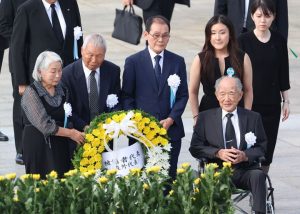Invited by Hiroshima City, 10 representatives of A-bomb survivors and bereaved families from the United States, South Korea, and Brazil attend Peace Memorial Ceremony
Aug. 7, 2025
by Rie Nii, Staff Writer
On August 6, a total of 10 representatives of atomic bomb survivors and bereaved families living in the United States, Brazil, and South Korea attended the Peace Memorial Ceremony. They were invited by the Hiroshima municipal government as a project marking the 80th anniversary of the A-bombing. They reaffirmed their commitment to the abolition of nuclear weapons and to passing on their experiences.
Kunihiko Bonkohara, 85, who lives in Brazil, said, pressing his eyes to hold back tears, “The number of A-bomb survivors has fallen from 270 to only 55. As I prayed in silence, the faces of the deceased came to mind one after another.”
Mr. Bonkohara conveys the disaster of the A-bombing through a dramatic performance, appearing on stage himself. He wants the Japanese government to join the Treaty on the Prohibition of Nuclear Weapons (TPNW), but Prime Minister Shigeru Ishiba made no mention of it in his address. Mr. Bonkohara said with exasperation, “If Japan signs and ratifies the TPNW, more countries will follow its lead.”
Hisako Nakagawa, 82, a resident of the U.S. who attended the ceremony for the first time, said, “After hearing the elementary school students’ ‘Commitment to Peace,’ I felt we could entrust our wish for the abolition of nuclear weapons to the younger generation. Under the Trump administration in the U.S., I’ve heard more and more students are becoming interested in nuclear issues. I hope this trend will continue to grow.”
(Originally published on August 7, 2025)
On August 6, a total of 10 representatives of atomic bomb survivors and bereaved families living in the United States, Brazil, and South Korea attended the Peace Memorial Ceremony. They were invited by the Hiroshima municipal government as a project marking the 80th anniversary of the A-bombing. They reaffirmed their commitment to the abolition of nuclear weapons and to passing on their experiences.
Kunihiko Bonkohara, 85, who lives in Brazil, said, pressing his eyes to hold back tears, “The number of A-bomb survivors has fallen from 270 to only 55. As I prayed in silence, the faces of the deceased came to mind one after another.”
Mr. Bonkohara conveys the disaster of the A-bombing through a dramatic performance, appearing on stage himself. He wants the Japanese government to join the Treaty on the Prohibition of Nuclear Weapons (TPNW), but Prime Minister Shigeru Ishiba made no mention of it in his address. Mr. Bonkohara said with exasperation, “If Japan signs and ratifies the TPNW, more countries will follow its lead.”
Hisako Nakagawa, 82, a resident of the U.S. who attended the ceremony for the first time, said, “After hearing the elementary school students’ ‘Commitment to Peace,’ I felt we could entrust our wish for the abolition of nuclear weapons to the younger generation. Under the Trump administration in the U.S., I’ve heard more and more students are becoming interested in nuclear issues. I hope this trend will continue to grow.”
(Originally published on August 7, 2025)








